Topic: Three-legged stool
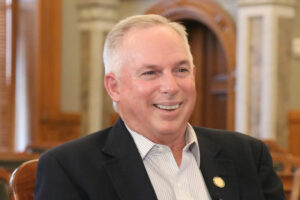
Interview of Don Hineman, August 20, 2020
Interviewed by Alan Conroy
Representative Don Hineman describes himself as a centrist Republican whose views were shaped by his service as a local elected official. In the interview he talks about the legislative process and his experience on the Federal and State Affairs committee passing a bill to designate the state fossil and why that was important to some of his young constituents. Hineman discusses the state's fiscal difficulties under Governor Sam Brownback and his efforts to work with House Democrat Bill Feuerborn to pass a sales tax increase, and then to override the gubernatorial veto. Hineman illustrates how the use Show Moreof power by legislative leadership can block something that the public wants using the issue of Medicaid Expansion. He concludes by talking about the decline of civility in the legislative process. Show Less
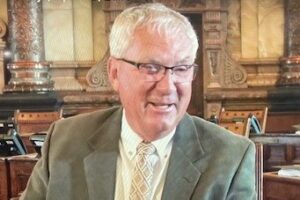
Interview of Fred Kerr, April 13, 2018
Interviewed by H. Edward (Ed) Flentje
Fred Kerr reflects on his 15 years in the Kansas Senate representing the 33rd Senate district. He recalls Senate leaders and fellow Senators who helped him as a freshman and whose influence guided him throughout his career. Fred talks about the process involved in securing a leadership position in the Senate and the dynamics of leadership races. He observes how relationships between competitors for leadership offices affected Senators differently and how they worked together in subsequent legislative sessions. He also reflects on how decisions were made regarding tax policy both to fund highways and public schools. Show MoreFred, who ran for Governor in 1994, comments about the increasing influence of money and monied interests in state-wide politics. A previous oral history interview of Fred Kerr is here. Show Less
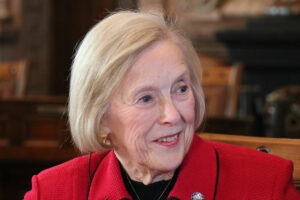
Interview of Audrey Langworthy, October 18, 2019
Interviewed by Joan Wagnon
This 2019 oral history interview of former Kansas State Senator Audrey Langworthy covers her first race to unseat long-time State Senator Norman Gaar, a race she won in 1984 and her four subsequent terms--a total of 16 years. Some of her new colleagues in the Senate steered her to the Assessment and Taxation Committee which she ultimately chaired and loved. Langworthy's tenacity comes through in the interview as she talks about the steep learning curve when she got to the Senate and to the Tax Committee. She received death threat letters after her vote on capital punishment which she sent Show Moreto the Kansas Bureau of Investigation. This interview includes an interesting discussion of strategy developed to pass the 1999 transportation plan and Langworthy's role in it. Her depiction of her views on leadership, her "personal first bill" on the Oregon Trail, and the Bi-state Cultural District bill are worth reading for insight into how Langworthy operated in the Senate and how the increase in the number of women Senators changed the culture of the Senate. Show Less
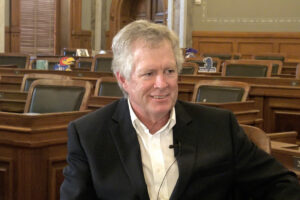
Interview of Dennis McKinney, August 23, 2019
Interviewed by Dale Goter
Dennis McKinney developed many insights in his sixteen years as a leader in the minority party into how the legislature did work, and how it should work. He recounts numerous instances when things worked well because of bipartisan cooperation and compromise. McKinney's experiences on the House Energy and Natural Resources committee working with Carl Holmes and Ken Grotewiel helped shape water policy in Kansas. His experience as a farmer and rancher in south central Kansas coupled with his focus on problem solving led to his reputation as a "middle of the road legislator" who would work Show Morewith both political sides as well as urban and rural. McKinney was committed to public education as well as conservation. The pursuit of fair and balanced tax policy shaped his actions. The interview highlights the importance of leadership from the governor's office and other legislative leaders (Mays, Shallenburger, D. Kerr, Morris). There is an interesting segment about the 2005 Special Session on school finance where McKinney talks about using the courts as leverage. The interview concludes with a brief discussion of the Greensburg tornado. Show Less
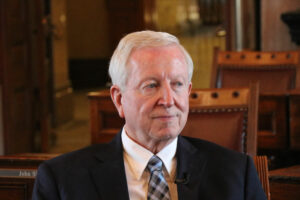
Interview of Steve Morris, July 15, 2020
Interviewed by Joan Wagnon
Senate President Steve Morris gives a lengthy and detailed account of his twenty years in the Senate and his eight years as president. A former Hugoton school board member, Morris challenged a 16 year incumbent Democrat (Leroy Hayden) and won by a 2:1 margin in the 1992 election. During this period there were several high profile issues which Morris championed. Casino gambling passed in 2007 after a 12 hour filibuster. A coal-fired plant (Sunflower Electric) in Holcomb wanted to expand but Governor Sebelius vetoed that bill, twice. The Special Session of 2005 dealt with a Show MoreSupreme Court order to increase education funding to constitutional levels which took 12 days to develop a consensus. A 2010 transportation plan was passed during a recession. Morris initiated a three-university plan to increase the number of engineers in the state by 65 percent beginning in 2011, assisted by Senator Carolyn McGinn. Governor Sam Brownback's "tax experiment" which was passed in 2012 took huge amounts out of the transportation plan to close budget gaps. The interview contains a detailed account of the shenanigans that took place after the Senate refused to pass the Brownback bill. The Governor pleaded with Morris to reverse their action and send the bill to conference, which Morris did, only to find the House concurring to pass the original bill. Morris ran again, but was defeated in a Republican primary. Show Less

Interview of Joan Wagnon, May 11, 2018
Interviewed by H. Edward (Ed) Flentje
Ed Flentje's interview of former Representative Joan Wagnon is lengthy and complete, covering her 12 years in the state legislature, 4 years as Mayor of Topeka, and 8 years as Secretary of Revenue. She talks about the work of the House Taxation Committee in implementing legislation after passage of a constitutional amendment classifying property for tax purposes. Wagnon discusses the 1992 school finance lawsuit which produced massive change in the school funding formula, including how the concepts were developed and what strategies were used to get them passed. The interview covers in detail how the House Democrats interacted with Show MoreGovernor Finney in the 1991 session, when Finney vetoed the major tax bill and the Supreme Court found the school finance formula to be unconstitutional. Wagnon served as facilitator for the Children's Initiatives Committee which Speaker Marvin Barkis chaired. That committee produced fourteen bills that affected children and families. Economic development issues are discussed in the last part of the interview which links Wagnon's legislative interests to her work as Mayor of Topeka: neighborhood revitalization, spreading the tax base from city to county for Washburn University and the library, and developing economic development infrastructure to attract growth and new business for Topeka. She also discusses some of her eight years as Secretary of Revenue, particularly her involvement with the Streamlined Sales Tax.
A version of this interview is also posted on KansasMemory.org, the website of the Kansas Historical Society. Show Less

Interview of Wayne Zimmerman, April 13, 2023
Interviewed by Dave Webb
Wayne Zimmerman of Olathe returned to the Kansas Capitol many years after being elected in 1964 to the House of Representatives. Zimmerman is apparently the last surviving member of the class of 1965-66 House of Representatives that was elected prior to the historic One-Person-One-Vote decision. When he was reelected to a second term in 1966, he was elected to represent a district, not the county. Zimmerman served two terms in the Kansas House and later, after 4 years, a term in the Kansas Senate. In his interview, Zimmerman talked about farming in Johnson County, his military Show Moreservice as a pilot, and how the reapportionment court decision substantially changed the legislature. Schools remained a consistent legislative focus, even after substantial consolidation in the early 1960's. Wayne had no office, but did his legislative work at his desk on the floor in the House chambers. He had several stories to tell about how the legislature operated then. Show Less
